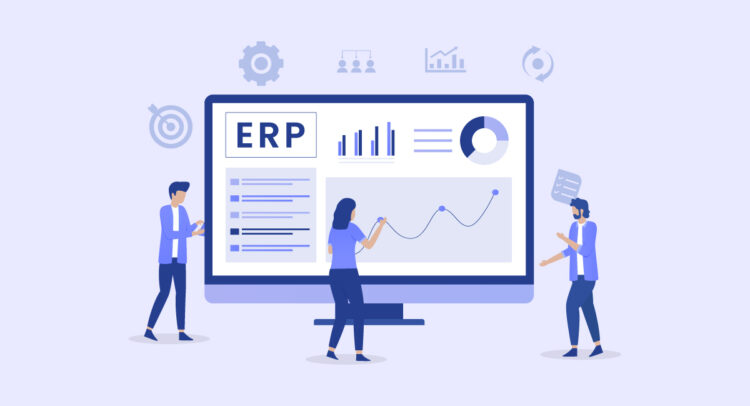In today’s rapidly evolving business landscape, organisations face an ever-increasing challenge to streamline operations, reduce costs, and enhance productivity. Systems for enterprise resource planning (ERP) have become a potent means of addressing these issues, but implementing them successfully can be a daunting task. This is where an ERP consultant comes into play, serving as the guiding light that helps businesses navigate the journey from chaos to clarity.
The Role of Enterprise Resource Planning Consultants
They are the unsung heroes behind many successful business transformations. Their role is multifaceted, encompassing everything from identifying the right ERP solution to managing the entire implementation process. Here’s a breakdown of how these consultants contribute to this transformative journey:

- Strategic Planning: They embark on their transformative journey by thoroughly understanding the client’s intricate business processes, both current and envisioned. They meticulously delve into the client’s goals, assessing short-term objectives and long-term aspirations, all while empathetically identifying the unique pain points that hinder growth and operational excellence. Working in tandem with the client’s leadership team, they facilitate a collaborative approach, ensuring that the ERP implementation strategy is not just a standalone endeavour but a harmonious symphony that resonates with the company’s overarching business objectives.
- Vendor Selection: Identifying the right ERP vendor is not just a task; it’s a pivotal decision that can significantly impact an organisation’s future. These consultants, armed with their wealth of industry knowledge and expertise, go beyond a cursory evaluation of vendors. They conduct in-depth assessments, considering factors like scalability, compatibility, support, and cost-effectiveness. These consultants meticulously analyse various ERP options, tailoring their recommendations to the unique needs and goals of the business.
- Customisation: ERP systems are not one-size-fits-all. These Consultants tailor the chosen ERP system to the specific requirements of the client, ensuring seamless integration with existing systems and processes.
- Change Management: One of the most challenging aspects of ERP implementation is managing the resistance to change within the organisation. They develop change management strategies to ease the transition and ensure that employees embrace the new system.
- Training and Support: They provide training to the staff, enabling them to use the new system effectively. Additionally, they provide continuing assistance to deal with any problems that may develop after deployment.
Key Benefits of ERP Consultancy

1. Strategic Alignment
ERP consultancy plays a pivotal role in aligning your ERP system with your overarching business objectives, ensuring that your technology infrastructure is in perfect harmony with your long-term goals. Expert consultants delve deep into your existing processes, meticulously identifying gaps, redundancies, and bottlenecks. They not only pinpoint these issues but also recommend and implement tailored solutions, streamlining your operations and boosting overall efficiency.
This strategic alignment empowers your organisation to make well-informed, data-driven decisions that not only foster growth but also enhance your competitive edge, ultimately positioning your business for sustained success in a rapidly evolving market landscape.
2. Expertise and Experience
ERP consultants bring a wealth of invaluable expertise and hands-on experience to the forefront. With a track record of successfully navigating diverse ERP implementations across industries, they have a comprehensive understanding of what works best. Their profound knowledge of industry best practices and standards serves as a compass, guiding your project away from common pitfalls and towards a smoother, more effective ERP deployment.
By tapping into their well-rounded experience, you can make well-informed decisions at every juncture, whether it’s selecting the right ERP solution, customising it to fit your unique needs, or seamlessly integrating it into your existing infrastructure.
3. Customisation and Optimisation
They delve deeply into your organisation’s DNA, meticulously assessing your unique business needs and intricacies. Armed with this understanding, they skillfully tailor the ERP system to align seamlessly with your specific requirements. This customisation extends to optimising workflows, streamlining processes, and fine-tuning software configurations for maximal productivity and cost-effectiveness. The result?
You not only get the most out of your ERP investment but also gain a formidable competitive edge, as your ERP system becomes a finely-tuned instrument that empowers your business to thrive in a dynamic marketplace.
4. Risk Mitigation

ERP implementations often navigate treacherous waters rife with complexities and potential pitfalls, including budget overruns and project delays. These consultants, with their seasoned expertise, play a pivotal role in identifying and proactively mitigating these risks. They craft meticulous project plans, masterfully manage resources, and maintain vigilant progress monitoring.
Through this comprehensive approach, they safeguard your ERP implementation, minimising disruptions to your core business operations and ensuring a smooth, on-time, and within-budget execution that positions your organisation for sustainable success in the ever-evolving business landscape.
5. Training and Change Management
They deliver comprehensive training programs and adeptly craft change management strategies that empower your workforce to seamlessly transition to the new system. They ensure that your staff not only grasps the intricacies of the ERP software but also learns to harness its capabilities efficiently, minimising the learning curve.
This effective training and change management orchestration leads to a higher rate of adoption among your personnel, accelerating the return on investment (ROI) of your ERP implementation and facilitating a smoother transition into the future of your business operations.
6. Scalability and Growth
These consultants design systems that can scale with your business as it grows, accommodating increased data, users, and processes. This scalability ensures that your ERP solution remains viable in the long term, reducing the need for frequent system upgrades. As your business expands, your ERP system can adapt to support new challenges and opportunities.
7. Cost Control
These consultants help control costs by providing accurate budget estimates, optimising resource allocation, and preventing unnecessary expenses. Through careful planning and monitoring, they ensure that your ERP project stays within budget. Cost control is essential for maximising the return on your ERP investment and avoiding financial setbacks.
Conclusion
Staying competitive in the modern business requires agility, efficiency, and adaptability. The erp consultant plays a pivotal role in helping businesses achieve these goals by transforming chaos into clarity. Their expertise, strategic guidance, and commitment to success make them indispensable partners on the journey toward a more streamlined and productive future.







